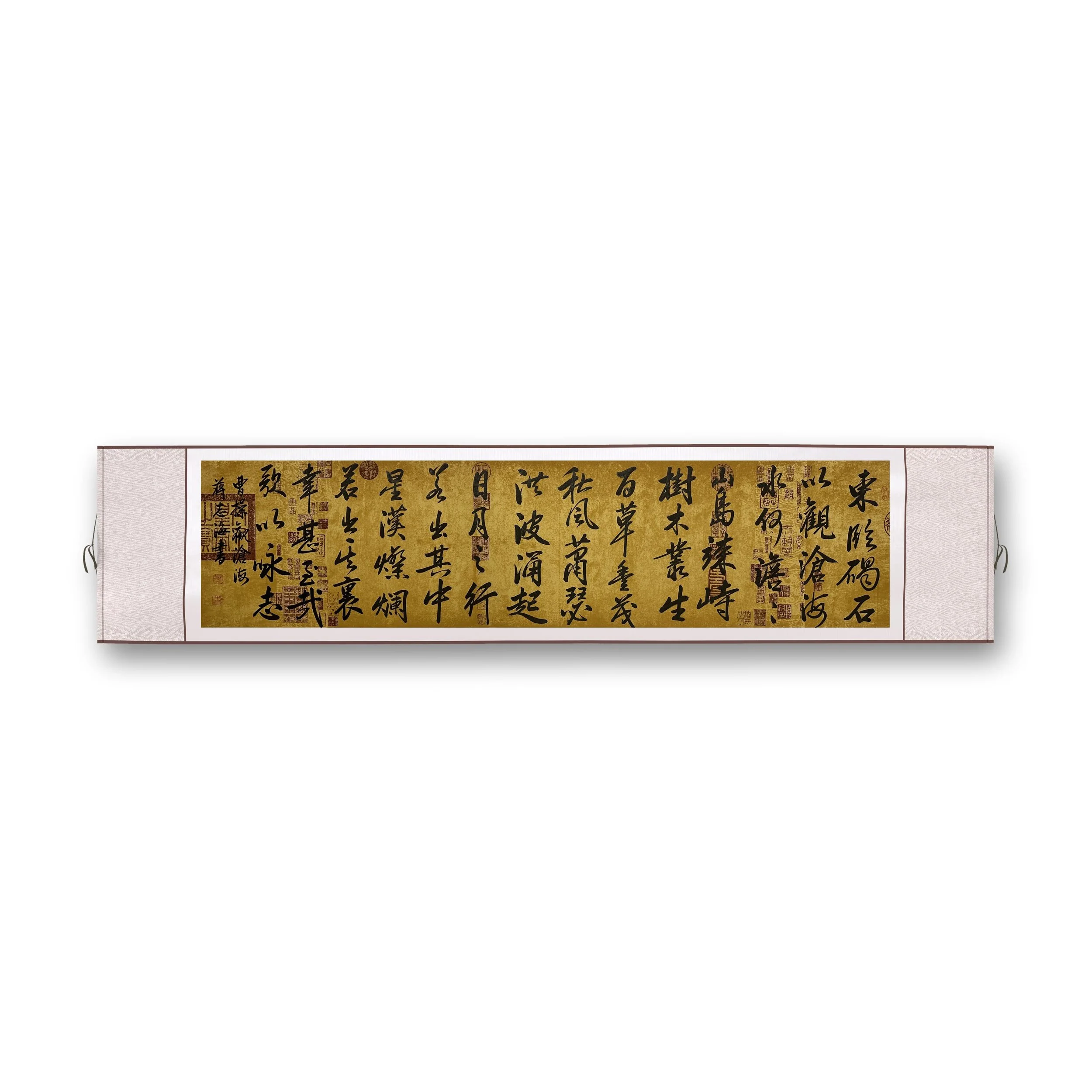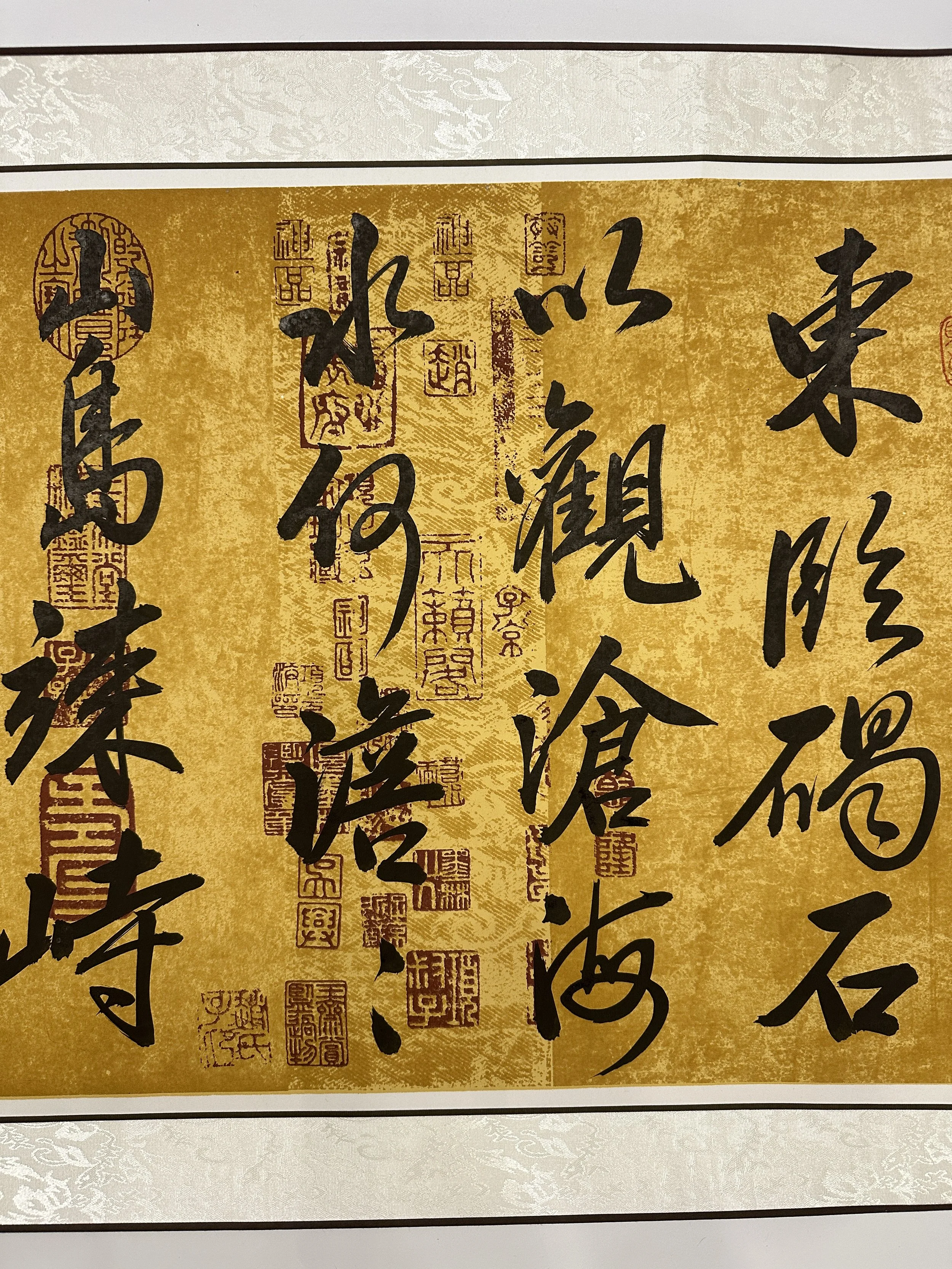 Image 1 of 8
Image 1 of 8

 Image 2 of 8
Image 2 of 8

 Image 3 of 8
Image 3 of 8

 Image 4 of 8
Image 4 of 8

 Image 5 of 8
Image 5 of 8

 Image 6 of 8
Image 6 of 8

 Image 7 of 8
Image 7 of 8

 Image 8 of 8
Image 8 of 8









观沧海 Viewing the Vast Sea
“观沧海” (Guān Cāng Hǎi), or “Viewing the Vast Sea”, is a famous classical Chinese poem written by Qu Yuan (屈原), one of the most prominent poets of the Warring States period (around 340–278 BCE). The poem is one of Qu Yuan’s most famous works, and it is widely admired for its vivid depiction of nature and its deep philosophical reflections on life, struggle, and the human condition.
Background:
Qu Yuan was a patriotic poet and a minister in the state of Chu. He was exiled after falling out of favor with the ruling court and was deeply distressed by his country’s political situation. The poem was written during his exile, and it expresses his feelings of isolation and disillusionment, while also demonstrating his profound thoughts on the forces of nature and life.
“观沧海” was written during a time when Qu Yuan was reflecting on both the grandeur of nature and his own personal struggles, particularly in relation to his country’s future. The sea in the poem symbolizes the vast, uncontrollable forces of nature, while the poet’s reflections are more about human resilience and how one can face overwhelming challenges.
Poem (in Chinese):
观沧海
作者: 曹操
海日生残夜,
气吞万里如虎。
乾坤成列,
天高地迥,
觉宇宙之无穷。
English Translation:
“Viewing the Vast Sea”
by Qu Yuan
The sea’s sun rises through the remaining night,
Its breath swallows ten thousand miles like a tiger.
The universe is set in its place,
The heavens are high and the earth vast,
Feeling the infinity of the universe.
Analysis & Themes:
1. Nature as a Symbol of Power:
The poem opens with a vivid description of the sea, emphasizing its vastness and power. The sea’s sun rising (海日生残夜) symbolizes new beginnings and a sense of strength. The description of the sea “swallowing ten thousand miles like a tiger” reflects the immense and unstoppable power of nature.
2. Philosophical Reflection on Life and the Universe:
The poet’s experience of standing before the sea evokes a sense of awe and a realization of the vastness of the cosmos. The heavens are high and the earth vast (天高地迥) highlights the enormity of nature, suggesting a contemplation of the universe’s vastness and the fleeting nature of
“观沧海” (Guān Cāng Hǎi), or “Viewing the Vast Sea”, is a famous classical Chinese poem written by Qu Yuan (屈原), one of the most prominent poets of the Warring States period (around 340–278 BCE). The poem is one of Qu Yuan’s most famous works, and it is widely admired for its vivid depiction of nature and its deep philosophical reflections on life, struggle, and the human condition.
Background:
Qu Yuan was a patriotic poet and a minister in the state of Chu. He was exiled after falling out of favor with the ruling court and was deeply distressed by his country’s political situation. The poem was written during his exile, and it expresses his feelings of isolation and disillusionment, while also demonstrating his profound thoughts on the forces of nature and life.
“观沧海” was written during a time when Qu Yuan was reflecting on both the grandeur of nature and his own personal struggles, particularly in relation to his country’s future. The sea in the poem symbolizes the vast, uncontrollable forces of nature, while the poet’s reflections are more about human resilience and how one can face overwhelming challenges.
Poem (in Chinese):
观沧海
作者: 曹操
海日生残夜,
气吞万里如虎。
乾坤成列,
天高地迥,
觉宇宙之无穷。
English Translation:
“Viewing the Vast Sea”
by Qu Yuan
The sea’s sun rises through the remaining night,
Its breath swallows ten thousand miles like a tiger.
The universe is set in its place,
The heavens are high and the earth vast,
Feeling the infinity of the universe.
Analysis & Themes:
1. Nature as a Symbol of Power:
The poem opens with a vivid description of the sea, emphasizing its vastness and power. The sea’s sun rising (海日生残夜) symbolizes new beginnings and a sense of strength. The description of the sea “swallowing ten thousand miles like a tiger” reflects the immense and unstoppable power of nature.
2. Philosophical Reflection on Life and the Universe:
The poet’s experience of standing before the sea evokes a sense of awe and a realization of the vastness of the cosmos. The heavens are high and the earth vast (天高地迥) highlights the enormity of nature, suggesting a contemplation of the universe’s vastness and the fleeting nature of
“观沧海” (Guān Cāng Hǎi), or “Viewing the Vast Sea”, is a famous classical Chinese poem written by Qu Yuan (屈原), one of the most prominent poets of the Warring States period (around 340–278 BCE). The poem is one of Qu Yuan’s most famous works, and it is widely admired for its vivid depiction of nature and its deep philosophical reflections on life, struggle, and the human condition.
Background:
Qu Yuan was a patriotic poet and a minister in the state of Chu. He was exiled after falling out of favor with the ruling court and was deeply distressed by his country’s political situation. The poem was written during his exile, and it expresses his feelings of isolation and disillusionment, while also demonstrating his profound thoughts on the forces of nature and life.
“观沧海” was written during a time when Qu Yuan was reflecting on both the grandeur of nature and his own personal struggles, particularly in relation to his country’s future. The sea in the poem symbolizes the vast, uncontrollable forces of nature, while the poet’s reflections are more about human resilience and how one can face overwhelming challenges.
Poem (in Chinese):
观沧海
作者: 曹操
海日生残夜,
气吞万里如虎。
乾坤成列,
天高地迥,
觉宇宙之无穷。
English Translation:
“Viewing the Vast Sea”
by Qu Yuan
The sea’s sun rises through the remaining night,
Its breath swallows ten thousand miles like a tiger.
The universe is set in its place,
The heavens are high and the earth vast,
Feeling the infinity of the universe.
Analysis & Themes:
1. Nature as a Symbol of Power:
The poem opens with a vivid description of the sea, emphasizing its vastness and power. The sea’s sun rising (海日生残夜) symbolizes new beginnings and a sense of strength. The description of the sea “swallowing ten thousand miles like a tiger” reflects the immense and unstoppable power of nature.
2. Philosophical Reflection on Life and the Universe:
The poet’s experience of standing before the sea evokes a sense of awe and a realization of the vastness of the cosmos. The heavens are high and the earth vast (天高地迥) highlights the enormity of nature, suggesting a contemplation of the universe’s vastness and the fleeting nature of
Return & Exchange Policy
At Momoon Art, each painting is a one-of-a-kind creation. As such, we do not accept returns or exchanges unless the item arrives damaged during the delivery process.
If your artwork is damaged upon arrival, please contact us within [7 days] of receiving your order. We will gladly offer a refund or exchange once the damage is verified.
Thank you for understanding and supporting unique, handcrafted art!
